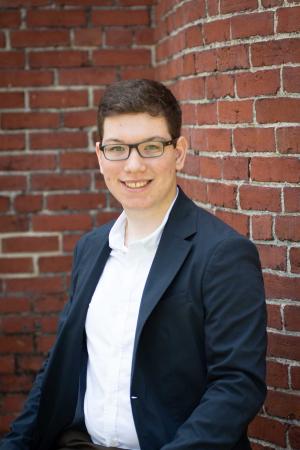
Jacob Akey ’24 has been named the first Grappone Fellow at the Gregory J. Grappone Humanities Institute. As a part of the fellowship, he will serve the Institute in an ambassadorial and programming support role, and will receive full tuition and fees.
“The selection of the first Grappone Fellow with the inauguration of our new building really punctuates both the generosity and vision of Bob and Bev Grappone,” said Professor Gary Bouchard, Ph.D., founding director of the Humanities Institute. “Jacob Akey has been an active participant in Grappone Humanity Institute conversations and activities, making it substantial part of his Saint Anselm education. For him to be selected among strong competition as the first Grappone Fellow is fitting.”
Akey is an international relations and economics double major, with a minor in the humanities. He serves as the Opinion Editor of the Crier, a NHIOP Ambassador, and a writing assistant for the Academic Resource Center. He is involved with the Center for Ethics, working on the New Hampshire Zoning Atlas Project, and participating on the business ethics case competition team.
“There are lots of students on this campus who are not humanities majors, myself included, who are deeply interested in what the humanities has to offer, but for whatever reasons feel like they didn’t get to choose a humanities major,” explained Akey. “We need to reach out and show them that there’s room for them in the humanities.”
Students interested in the fellowship submitted essays on their understanding of the “pursuit of happiness” using lessons learned in and outside of the classroom. A committee of faculty and administrators evaluated the essays, looked at the applicants’ academic and service achievements, selected finalists, and conducted interviews of the finalists.
In his essay, Akey discussed how the Benedictine vow of conversation gave him a framework to look at the pursuit of happiness as a journey.
“To pursue happiness is to go to work, knowing that others will benefit from your labor, in a profession where faith is not merely accepted but strengthened,” wrote Akey. “Eudaimonia might remain out of reach, but it is only a complete person of this model who will be close. The monks have it right. Ora et labora.”
